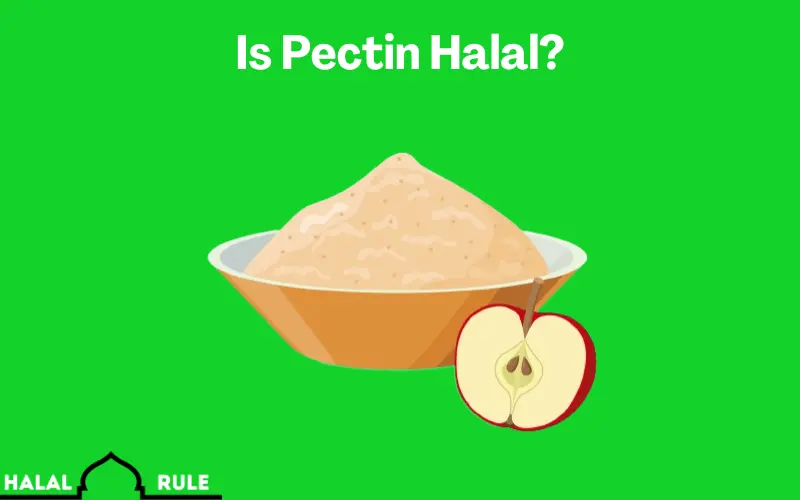Is Pectin Halal Or Haram? Gelling Agent?
Are you searching is pectin halal or haram? You’re not alone.
Pectin is a widely used ingredient in the food and pharmaceutical industry, and it’s important to know if it fits into Islamic dietary restrictions.
You might have seen pectin used as an ingredient in jams, jellies, and other food products, as well as in medicines and other pharmaceutical products. It’s derived from certain plant foods, and some people wonder what it is and if it is halal or haram.
So, in this article, we’ve given a clear answer on is pectin halal according to Islamic dietary restrictions. Read on to find the answer and learn more about pectin, its uses, pros and cons, and much more.

What Is Pectin?
Pectin is a complex carbohydrate made up of chains of galacturonic acid molecules, which are found in the cell walls of all land plants and some sea-dwelling organisms.
It’s extracted from fruits and vegetables such as apples, oranges, lemons, carrots, beets, and more to create a gelling agent for cooking and baking.
In addition to its culinary uses, pectin is also used as a thickening agent in many products ranging from cosmetics to pharmaceuticals. It’s even used to thicken paint, glue, and other industrial products.
Is Pectin Halal?
The short answer is that pectin is halal and can be consumed by Muslims following Islamic dietary laws.
This is because pectin is derived from plant sources that are considered halal in Islam. Additionally, pectin contains no pork or alcohol-based ingredients, which are forbidden in Islam.
However, if you see pectin as an ingredient on any packaging doesn’t mean the entire product is halal. You have to check the entire ingredient list for items like alcohol, pork fat, or other elements that may be considered haram. Only the pectin itself is halal.
Besides making pectin halal, reducing the use of haram ingredients in foods and cosmetics such as gelatin is also beneficial.
Gelatin is an animal-derived product that can confuse Muslims as it may be derived from pig or cow sources. So, pectin can be used as a substitute for gelling agents such as gelatin which are generally not halal.
The gelatin is used for various purposes, including thickening, binding, and stabilizing food products. Pectin can be used for the same purpose but in a halal-friendly way, as it is derived from plants only.
If you’re confused about glycerin, you can read is glycerin halal.
Uses Of Pectin
Along with being halal and a good substitute for gelatin, pectin is also used in several ways. It is commonly used to thicken jams, jellies and preserves and bind ingredients together in baking and cooking.
It can also be used in cosmetics such as creams and lotions to add texture, while its gelling properties are useful in tablets.
Pros And Cons Of Pectin
The primary pro of pectin is its halal status, making it a great ingredient for Muslims to use in food and cosmetics.
It has many functional uses, including thickening, gelling, binding, and stabilizing products.
On the flip side, pectin can cause some digestive issues when consumed and has a high sugar content. Careful use is necessary for those who are on a low-carb or low-sugar diet.
Also read is gluten halal.
Is Gelling Agent Halal?
Yes, gelling agents that are derived from plant sources are considered halal. This includes pectin, which is used to thicken jams, jellies, and other food products, as well as cosmetics such as creams and lotions.
However, gelatin is also a gelling agent that is not always considered halal as it is derived from animal sources. As a result, pectin can be used in place of gelatin to provide the same functions without compromising on Islamic dietary laws.
For more on this you can learn from our specific article is gelling agent halal.
How Pectin Is Made
Pectin is made by extracting it from the cell walls of fruits and vegetables such as apples, oranges, lemons, carrots, beets, and more. The extracted pectin is then processed into a powder or liquid form that can be used in various products.
The process of extracting pectin involves grinding up the plant material and then boiling it in an acid solution. The pectin is then separated from the liquid and dried into a powder or paste form that can be used in cooking and baking.
If you eat raw meat, you must read is raw meat halal.
FAQs
Q. Is gelling agent pectin halal?
A. Yes, pectin is a gelling agent derived from plant sources, and it is considered halal according to Islamic dietary laws.
Q. Is fruit pectin halal?
A. Yes, fruit pectin is considered halal as it is derived from plant sources and contains no haram ingredients.
Q. Is pectin a gelatin?
A. No, pectin is not a gelatin, although they are both used as gelling agents in products like jams, jellies, and cosmetics. Gelatin is derived from animal sources, whereas pectin is derived from plants.
Q. Is pectin gelatin halal?
A. No, pectin and gelatin are two different substances. Pectin is a naturally occurring carbohydrate found in fruits and vegetables, while gelatin is derived from animal sources such as bones and skin.
Q. Can Muslims eat pectin?
A. Yes, Muslims can eat pectin as it is considered halal. Pectin is a commonly used ingredient in many food and beverage products, including jams, jellies, and fruit snacks.
Q. Is pectin pork?
A. No, pectin is not pork. Pectin is derived from plant sources and does not contain any pork-based ingredients.
Q. Is gelling agent vegetarian?
A. It depends on the specific gelling agent being used. Some gelling agents, like pectin, are derived from plant sources and can be considered vegetarian. However, other gelling agents may contain animal-based ingredients and would not be considered vegetarian.
Conclusion
We hope that this article on is pectin halal or haram has helped clarify the status of pectin according to Islamic dietary laws.
Pectin is a widely used ingredient in the food and pharmaceutical industry, and it’s important to know if it fits into Islamic dietary restrictions.
We have given a clear answer on pectin halal status with additional information on its sources, uses, pros, and cons.
If you have any questions or comments, please leave them in the comments section below. We’d love to hear from you.






